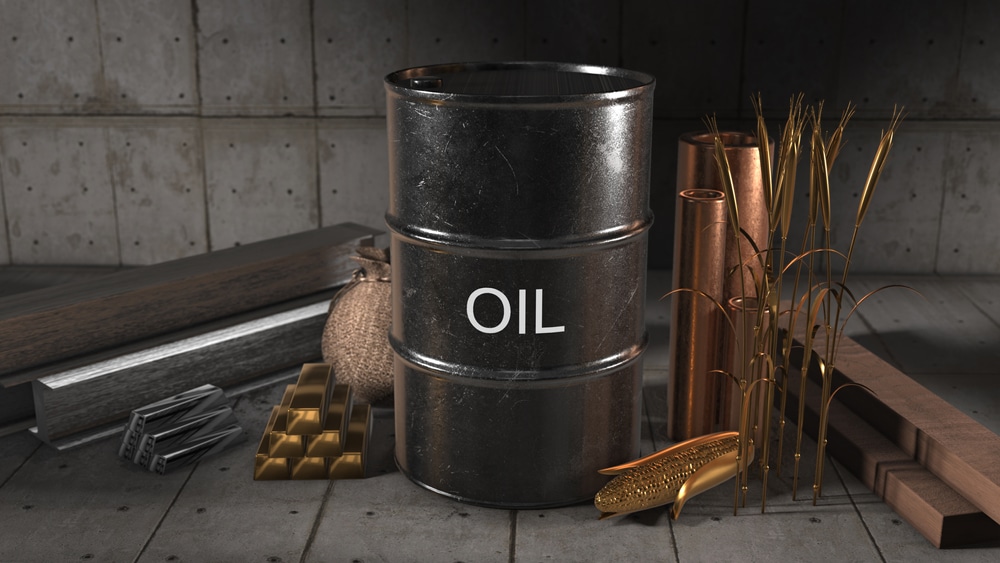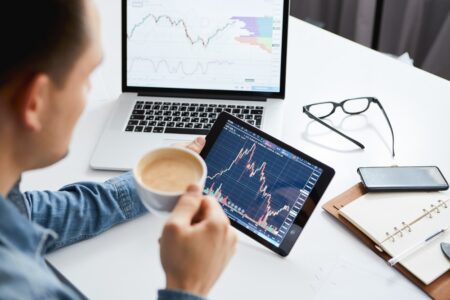Jasmine Birtles
Your money-making expert. Financial journalist, TV and radio personality.


If you’ve been keeping an eye on investment markets lately, you’ve probably noticed a huge resurgence in certain assets – i.e. commodities. So, you might be wondering how you can best invest in commodities to take advantage of this boom.
We’re going to cover all the basics you need to know about profiting from this sector. We’ll cover what options you have for the various assets. Also, where you can invest and some tips for increasing your chances of being a successful investor.
Keep reading for all the juicy details about investing in commodities or click on a link to jump to a specific section…
The best way to think of it is as a raw material. These materials are for manufacturing products, or have some use in their basic form.
Often, commodities are grouped into ‘hard’ and soft’ categories.
These hard cases usually need mining or drilling, and the softies can be grown or produced.
Examples of commodities that are relevant for those of you looking to make some money in this area includes:
Personally, I’m not a huge fan of investing in pigs and live cattle… but each to their own.

They often have limited or fixed supplies. This means that when demand for these materials increases, so too does the price.
Prices can also surge if demand remains the same, but the supply reduces.
Some areas of the economy can be annoyingly complex to wrap your head around. But, commodities are a lot simpler, which is why many investors love them!
During periods of inflation (rising prices), people often look to invest in commodities as a way to protect and hedge against rising prices.
They’re real and tangible things. You can even touch them – although I don’t recommend sticking your hand down a barrel of crude oil!
Yes! Investing and trading used to be only for those ‘in the know’. Or, for people wanting to operate completely outside the economic system.
Paranoid investors would buy bars of gold and run off to the woods, waiting for the financial apocalypse to wipe out every Starbucks and corrupt banker in sight.
Nowadays, you’d don’t have to be a doomsday prepper or an elite trading whizz.
Normal people like you and I can invest quite easily and cheaply. The main benefit of investing in these materials is that it gives you another way to diversify your investment portfolio.

This depends on what period of time you’re looking at.
If you zoom in on a certain period, any investment can look good or bad.
Over long periods, the price of most commodities has gone up. But, not necessarily as much as other investments
So, as long as you have a long-term mindset and you’re using this investment as part of a balanced portfolio – it can be a good investment.
The key – as with any form of investment – is to make sure you hold a variety of different investments, which can include a range of commodities.
Although this investing landscape is much more straightforward than it used to be, it can still seem confusing at first.
You can’t just walk down to your local bank branch and ask to buy a lump of silver or coal. Well, perhaps you can if your bank is held with Mr. Claus in the North Pole.
Normally, investments in this field are organised in different ways:
You can invest and buy shares in companies whose business is based around a certain commodity. This could include mining, drilling, or energy companies – who make up big chunks of the FTSE 100.
Some exchange-traded funds (ETFs) focus on specific assets like gold. If the ETF is ‘physically-backed’ it means that you’re indirectly purchasing that physical commodity. A commodity ETF will usually invest in a basket of a particular asset.
This stands for ‘exchange-traded commodity’ and allows you to invest in the price of a commodity without actually owning the underlying asset. An ETC usually focuses on a singular asset. So, it’s not as diverse as an ETF. But, it’s easier than trading ‘futures’ and ‘options’.
ETCs can be a nice, cheap and easy way to invest in commodities but you must make sure that there really is the solid commodity underlying the fund. Some ETCs (particularly gold ones) have been found to lend out the commodity they are tracking.
Investing in futures contracts is a more advanced way of trading. It’s a popular way to invest in commodities, but it can be quite complex and probably not the best place for you to start or find your feet.
It is still possible to organise buying the actual commodity itself. But, owning a giant grain silo may not be practical for the average UK household! However, it’s perfectly possible to buy gold or silver coins, platinum bars or even hunks of copper or zinc.
Find out here how to invest in gold the easy way.

Here’s an easy step-by-step guide to investing in commodities:
This will depend on your personal investing strategy and goals.
Investing in gold is probably the most common commodity choice to use in your portfolio. Here’s some more information about investing in gold and other money metals.
Everyone knows what gold is. It’s been valuable for thousands of years and it’s easy to understand the motivations for owning some of the hard yellow stuff.
And, over time, the price has been increasing, proving gold to be a solid investment.

This type of asset class does come with its own unique investing risks:
Commodity investing can be a great tool to have in your arsenal.
But, it’s still important to keep things simple, using this type of investment in line with the rest of your overall strategy and goals.
If you’re looking to invest in commodities, make sure you do plenty of research to understand exactly what it is you’re buying.
For those of you wanting more information on investing in gold, check out this free webinar covering why you should invest in gold and how to do it.
And, if you want to stay up to date with all the latest in the world of investing – make sure you sign up to our fortnightly Investing Newsletter.
We also have plenty of investment resources here at the MoneyMagpie website, updated regularly to keep you informed and in the loop.
This is not financial or investment advice. Remember to do your own research and speak to a professional advisor before parting with any money.
Direct to your inbox every week
New data capture form 2023
"*" indicates required fields

Leave a Reply